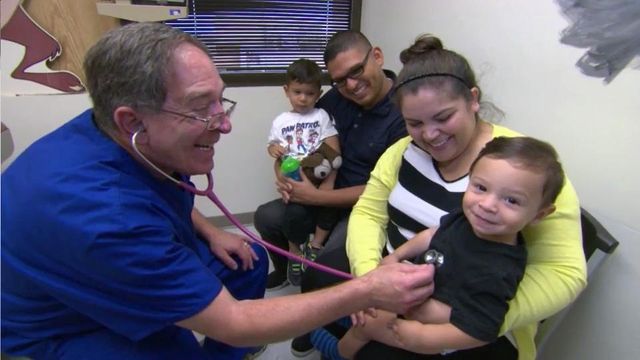Some doctors won't see patients with anti-vaccine views
With 102 confirmed cases in 14 states, a nationwide measles outbreak is renewing questions about the importance of vaccinations and an ethical debate among doctors about whether they should refuse to treat unvaccinated patients.
Posted — UpdatedJeffers, Mann & Artman Pediatrics in Clayton has taken a zero-tolerance stance on vaccines, advising parents to have their children immunized or find another doctor.
Dr. Mary Evelyn O'Neil, a pediatrician at the practice, says one case can start an outbreak.
"That newborn baby in our waiting room who hasn't had a chance to get a vaccine – we want to protect them from the child sitting next to them who might be coming in with measles," O'Neil said.
O'Neil says the practice changed its policy about a year ago and since then, has had to turn away some patients.
It's a sentiment echoed by a small number of doctors across the nation who, in recent years, have followed similar actions in an effort to lead parents to change their minds.
The American Academy of Pediatrics says doctors should bring up the importance of vaccinations during visits but should respect a parent's wishes unless there is a significant risk to the child.
Some people worry that vaccines cause developmental problems, despite scientific evidence disproving any link. Others object for religious or philosophical reasons.
Some doctors are adamant about not accepting patients who do not believe in vaccinations, saying they don't want to be responsible for someone's death from an illness that was preventable.
Other doctors, however, say it is best to seek alternatives, such as separate waiting rooms.
Dr. David Tayloe, a Goldsboro pediatrician and former president of the American Academy of Pediatrics, says the dilemma is a difficult one.
He practices in a rural area where access to primary care pediatricians is limited.
"It's, ethically, very difficult to say you can't bring your child to our practice," he said.
Still, he too is now taking a tougher stance by allowing patients up to six months to decide if they will immunize.
If not, he asks them to find care elsewhere.
Before the introduction of a measles vaccine in 1963, 3 million to 4 million Americans contracted the disease each year, according to the U.S. Centers for Disease Control and Prevention. Of those, 400 to 500 died and 48,000 were hospitalized.
Thanks largely to the measles-mumps-rubella vaccine, which is 97 percent effective, measles were considered eliminated in the United States in 2000.
All states require children to get certain vaccinations to enroll in school, but 20 states that let parents opt out by obtaining personal belief waivers.
In recent years, nearly all U.S. measles cases have been linked to travelers who caught the virus abroad and spread it in this country among unvaccinated people.
Public health officials say most of the measles cases in the current outbreak have been traced directly or indirectly to Disneyland in Southern California, where two people with the disease visited in December
No cases have been reported in North Carolina.
• Credits
Copyright 2024 by WRAL.com and the Associated Press. All rights reserved. This material may not be published, broadcast, rewritten or redistributed.





